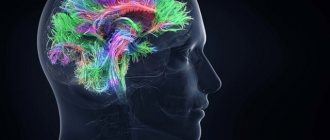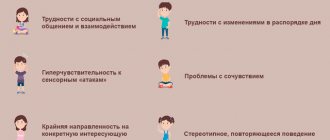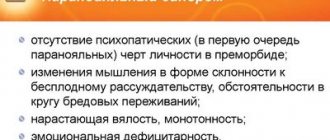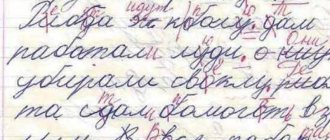The harmful effects of alcohol-containing products on the body have been known for a long time. Abuse of alcoholic beverages for quite a long time leads to the development of various pathologies. Quite often, alcoholics are diagnosed with Korsakov amnestic syndrome , which is expressed in memory disorders. The patient loses the ability to remember current events, while memory of the past is still present.
The Russian psychiatrist S.S. Korsakov studied and described this condition, and the syndrome later received his name.
Initially, it was believed that such memory impairments occur as a result of prolonged consumption of alcohol in large quantities. But further research of this issue by other psychiatrists showed that the main reason for the development of the pathology described by Sergei Korsakov is a lack of vitamin B1, which can be caused by various disorders of the entire central nervous system and individual areas of the brain, including age-related degenerative processes.
Modern psychiatry considers Korsakov's syndrome as an independent nosological unit, which is a special type of amnesia.
Manifestations of Korsakov's syndrome
According to medical reference books and a large psychological encyclopedia, the main symptom of this disease is the inability of a sick person to remember and reproduce new information (fixation amnesia). Everything that happened before the illness was well preserved in memory. A person’s consciousness does not record events that happened with his participation very recently or are happening at the moment. Clinically this manifests itself as follows:
- the patient is poorly oriented in space if he finds himself in a new place. While in a hospital, a person is unable to find the room or bed he needs, but at home such problems do not arise. This is because long-term memory works relatively normally. Moving to a new place or simply rearranging furniture can become severe stress for the patient, which can give impetus to the rapid progression of the disease;
- disorientation in time. If a person has been diagnosed with Korsakoff syndrome , then most likely he will not be able to correctly name today's date, month and year. He simply does not understand where he is and what is happening to him;
- in a conversation, the patient mentions events that have never happened to him (confabulation). The patient's stories can be fantastic; you can hear from him that yesterday he fought with monsters in another universe or sailed in a submarine. Those around him consider this to be fiction or an outright lie, but the patient himself has no idea that he is telling a lie;
- events that have ever taken place in a person’s life are shifted in time space (pseudo-reminiscences). In this way, memory gaps are involuntarily filled. A person’s stories are quite ordinary in nature; he can say that yesterday he went to the theater for a new production or went out of town. But in fact, these events happened much earlier;
- replacing gaps in memory with events from movies or books. The patient has some information, but he does not know when and how he received it. For example, he can pass off a poem he once memorized as his own work. Over time, the sick person perceives other people's thoughts as his own.
- Concentration is difficult, willpower is reduced.
Korsakoff's syndrome is often accompanied by retrograde or anterograde amnesia. The patient's emotional state is unstable. Lethargy, indifference and apathy are replaced by complacency and euphoria.
Organic amnestic syndrome
The diagnosis of amnestic syndrome is based, in fact, on identifying amnesia and the organic background that could cause it.
However, such a diagnosis in itself is only possible as an additional and clarifying one, or in cases where there is an organic basis, but has not yet been specified. That is, the diagnosis can be considered in a chronic course (more than 3 months) as intermediate or retrospective. For example, in case of hypoxia as a result of incomplete suicide or cardiac arrest, after the first traumatic brain injury, the initial diagnosis of organic amnestic syndrome is usually justified, but in its chronic course such as hypoxic encephalopathy or traumatic brain disease, one should usually think about the increase in the dementing process. Previously suffered traumas with retro-anterograde amnesia may not have any effect on the current mental state, but the past amnesia affects behavior and motivation according to the principle of a trace reaction. The individual's reaction to amnesia is often active and may be accompanied by worry, anxiety or confusion.
The main clinical criteria are:
1. Fixation, anterograde and retrograde amnesia, memory loss according to Ribot’s law;
2. Findings suggestive of stroke or brain disease (especially involving bilateral diencephalic and medial temporal structures);
3. No defect in direct playback (memory for current events is not changed);
4. No disturbance of attention and consciousness.
Additional symptoms: confabulations, emotional changes, etc.
Clinical example: Patient 35 years old, associate professor at the university. The medical history is unremarkable. As a result of atrial fibrillation, cardiac arrest occurred and clinical death was recorded; The restoration of heart rhythm was carried out using defibrillation. Over the next three months after staying in intensive care, asthenia is noted and he prefers loneliness. He doesn’t remember exactly what subject he taught, although the formal knowledge is preserved, he doesn’t remember the topic on which he defended his dissertation, or the acquaintances he has acquired over the past 2 years. He looks at the dissertation abstract with surprise. He also does not remember the events during his month in intensive care. He takes care of himself, tries to read and restore his memory, but as a result of fixation amnesia he has difficulty remembering.
Differential diagnosis
Amnestic organic syndrome should be differentiated from dementia, dissociative amnesia, amnesia as a result of the use of psychoactive substances, and multiple personality disorders.
In the acute stage, the differential diagnosis is based only on a neurological examination, objective examination data, and anamnesis. In dementia, the course of amnesia is chronic, accompanied by impairments of other cognitive functions. When using psychoactive substances, there is a violation of the reproduction of immediate events, that is, fixation disorders, which are rare in organic amnestic syndromes. Dissociative amnesia is the result of repression of a traumatic event and is directly related to it; no organic background is detected in it. In multiple personality disorders, amnesia is preceded by behavioral style, motivation and memory related to another personality.
Reasons for formation
The development of Korsakoff's syndrome is caused by a lack of thiamine (vitamin B1) in the body. This microelement is involved in the mechanism of formation of nerve impulses and their transmission between individual nerve cells. Disturbances in these metabolic processes lead to the deep structures of the brain suffering.
Such vitamin deficiency, as mentioned above, most often develops as a result of prolonged alcohol consumption, since the body’s absorption of this vital microelement is disrupted. First, the alcoholic develops acute encephalopathy, which, if left untreated, in most cases leads to the development of Korsakoff's syndrome.
Other causes of Korsakoff amnestic syndrome are:
- Severe head injuries affecting different parts of the brain.
- Age-related degenerative processes such as Alzheimer's type dementia and Pick's disease.
- Diseases of the nervous system caused by various infections.
- Encephalitis of various types.
- Intoxication of the body, including heavy metals.
- Diseases of the digestive tract and vomiting that continues for a long time.
- Constant malnutrition due to alcoholism, the fight against excess weight with the help of debilitating diets or fasting.
- As a side effect of chemotherapy.
- The consequence of surgical operations on the temporal lobes, they are performed to treat epilepsy.
All of these neurological diseases affect limbic structures, organic damage to which can cause serious malfunction of the brain.
A case of the development of amnestic syndrome after a patient was bitten by a centipede, which is found in Japan, was also described. Insect venom penetrates various parts of the brain and blocks the processes responsible for the normal functioning of memory.
Korsakoff's amnestic syndrome may not progress for many years, and with timely and competent treatment, regression of the main symptoms is observed. However, if the disease is ignored, Korsakov's psychosis develops. The patient in this state is completely unable to navigate in time and space, and no longer recognizes the people around him. He has delusional thoughts and ideas, which are immediately erased from memory, and isolated hallucinations may also occur.
Like a child!
Speech is a complex process in which different areas of the cerebral cortex actively interact. Thus, Wernicke's area is responsible for understanding; signals are formed in Broca's area, which ultimately turn into words and phrases. The role of auditory and visual analyzers is important. When a person talks, the whole brain is actively working. It establishes connections, for example, between the image of a spoon and the word that denotes this object. It is these connections that are destroyed in patients with amnestic aphasia. This is the difference between patients of the NeuroSpectrum Center for Pediatric Speech Neurology and Rehabilitation, who are being treated for amnestic aphasia, and healthy children. The normal process of forming connections goes by itself, and if connections are destroyed, their restoration requires outside help. Fortunately, children's brains are plastic, and it is easier to help our patients than adults and especially older people.
Diagnostic methods
A diagnosis such as Korsakoff syndrome can be made after detecting signs of vitamin B1 deficiency. A blood test and testing of basic liver functions can indicate a thiamine deficiency. In addition, a general examination of the patient is carried out. However, to make a clinical diagnosis, it is necessary to have a stable symptom - impaired memory function due to prolonged use of alcoholic beverages. Psychological tests for memorizing phrases or individual words help identify memory problems.
For treatment to be successful, it is important at the diagnostic stage to differentiate Korsakov's syndrome from other pathological processes in the nervous system, which can also be caused by alcoholism. It is also important to rule out other disorders that may cause memory problems that are not related to alcohol use. These include: dementia, organic brain damage, depressive disorders, etc.
What is asthenia or asthenic syndrome?
The word “asthenia” is translated from Greek as “lack of strength” or “weakness.” Hence the leading symptoms of asthenia: high fatigue and impotence.
Asthenic syndrome is the most nonspecific syndrome. It manifests itself in both somatic diseases and mental disorders. A lowering of the threshold of response to external and internal stimuli and rapid depletion of these reactions is the main clinical symptom of asthenia. It is called "irritable weakness."
Today, our lives proceed with mega loads, which are accompanied by severe fatigue. And if we don’t stop in time and don’t give ourselves relaxation and little pleasures, then this is fraught with consequences.
It is important to learn to distinguish between ordinary fatigue, which occurs after excessive intense physical or mental stress, movement between different climatic zones and time zones, irregular work and rest, from asthenia, which needs to be treated, and which will not go away on its own, even if you try to this effort? Asthenia develops over time.
The difference between the development of asthenic syndrome and ordinary fatigue of a physiological nature lies in the gradual increase in the process. Manifestations consistently become more intense and persist for a long time (from several months to several years). As a rule, with asthenia, proper rest does not give the desired result. The fatigue doesn't go away. Then there is a need for medical intervention.
Often the primary symptoms are excessive fatigue and irritability. As a rule, they go in combination with incontinence and a continuous desire for activity. Which is paradoxical, even in an environment conducive to relaxation and rest. This is referred to as “weariness that does not seek rest.”
First of all, the appearance of asthenia is due to a lack of functional capabilities (exhaustion) of the nervous system to cope with its overstrain.
The consequences of intoxication (auto- or exogenous origin), disruption of the blood supply to the brain, as well as metabolic processes in its tissue can also cause asthenic syndrome.
Because of this, asthenia can be characterized as an adaptive reaction of the body. In this case, the purpose of such a reaction is to reduce the activity of all its systems in order to conserve energy and subsequently restore them to pre-painful functioning.
Asthenic syndrome is characterized by a feeling of general weakness, which is permanent, increased fatigue regardless of the presence of loads, and decreased ability to work.
Also with asthenia, other characteristic symptoms occur:
- pain (muscle pain, headache, pain in the chest and abdomen, etc.);
- dizziness;
- feeling of tension;
- sleep problems;
- disruption of the gastrointestinal tract (decreased appetite, spastic constipation, pain along the intestines);
- potency disorders in men;
- difficulty relaxing;
- increased irritability.
Frequent accompaniments of asthenia are also problems with cognitive processes:
- attention (absent-mindedness, difficulty concentrating);
- memory (perception of new information, impairment of short-term memory, inability to remember recent moments).
Therefore, asthenia is always accompanied by a drop in labor productivity, especially intellectual productivity. Patients complain of frequent forgetting, absent-mindedness, poor intelligence, and instability of attention.
It can be extremely difficult to concentrate on something. You have to make an effort to think about a certain subject or matter, but over time, patients with asthenia begin to understand that the thoughts that appear in their head are not at all related to the desired subject or matter, i.e. completely irrelevant to the situation in which the patient is or what he is doing.
The number and clarity of ideas is also lost in asthenic syndrome. It can be extremely difficult for a person with asthenia to express what he wants. The words are either confused or very difficult to find. As a result, the thought that is formulated seems extremely vague, inaccurate and incomprehensible to the interlocutor, since it poorly reflects the necessary meaning. Patients are very upset because they feel incompetent.
It is important to note that with asthenic syndrome, even rest does not help improve well-being. Patients make a lot of effort to cope with the difficulties that arise. Can divide questions into parts to solve them. But, as a rule, comes even greater fatigue or dissipation in activities.
As a result, any activity seems very difficult, irresistible and requires extreme effort. This increases tension, anxiety and irritation with your weakness. Such patients are convinced of their intellectual failure.
At the same time, the emotional state is characterized by a lack of mental balance. Signs of this: short temper, irritation, loss of self-control, pickiness, grumpiness and dissatisfaction.
A sharp change in mood is also one of the manifestations of asthenia. The reason that can lead to anxiety or immersion in pessimistic thoughts can be very small and insignificant. But, at the same time, optimism may appear, the reason for which is difficult to find.
There is also a certain hyperesthesia (heightened sensitivity of the analyzers), mainly to saturated bright light and too loud sounds. Sentimentality and tearfulness arise, tears often occur as a reaction to certain events (both negative and positive).
With asthenia, one can constantly observe, in various variations, the ratio of symptoms such as irritability, fatigue and mental imbalance.
Asthenic syndrome is accompanied by various vegetative disorders:
- in the cardiovascular system (high or low blood pressure, increased heart rate, chest pain);
- feeling of heat without increasing body temperature, redness or paleness of the skin;
- intense sweating, local (armpits, feet, palms) or general.
People with asthenia have sleep problems, which manifest themselves in difficulty falling asleep, a predominance of shallow sleep with a significant number of disturbing dreams, frequent awakenings and difficulty in subsequent falling asleep. Sleep does not bring restoration of strength and energy, patients do not feel rested.
When asthenia worsens against the background of psychophysical stress, daytime drowsiness is observed. At the same time, night sleep remains unsatisfactory.
The daily dynamics of the syndrome can be traced in a sufficiently resourceful state in the morning and an increase in symptoms in the evening.
The manifestations and severity of asthenia are aggravated in the evening, i.e. after noon. In the morning, asthenic symptoms may not even be observed in some cases.
Treatment and prevention
Treating Korsakoff syndrome is quite difficult. The success of therapy will depend on many factors, including:
- degree of social adaptation of the patient;
- his age;
- health status;
- duration of alcohol consumption;
- degree of brain damage.
The main problem is that a person who begins to develop Korsakoff's syndrome does not realize it. Memory lapses can also remain invisible to others, since the patient masks them with long statements and florid thoughts. Even after diagnosis, patients often refuse treatment, considering themselves completely healthy people.
Treatment carried out after diagnosis is aimed at eliminating the cause that caused it. If memory defects are the result of alcoholism, then the basis of therapy is drugs containing thiamine and other trace elements that can minimize brain damage.
Nootropic drugs can significantly improve memory, increase the patient’s attentiveness and learning ability. If anxiety and increased excitability are present, the patient may be prescribed antipsychotic drugs in small doses.
Effective treatment
The main goal of therapy is to eliminate the underlying factor that led to the development of the disease. If tumor formations, hematomas and other space-occupying structures are detected, the patient is indicated for neurosurgical intervention with their removal. For neuroinfections, etiotropic therapy is prescribed - antibacterial, antifungal or antiviral drugs.
Treatment of amnestic aphasia and elimination of its symptoms includes medicinal and non-medicinal types of treatment. The following drugs are chosen among the medicines:
- nootropics (Phenotropil, Piracetam, etc.), which improve metabolism in the nervous tissue and help improve cognitive functions;
- medications that improve cerebral circulation: Actovegin, Cerebrolysin and their analogues (increase the delivery of nutrients and oxygen through the blood to the cerebral cortex, which has a positive effect on a person’s cognitive skills).
Any medications should only be prescribed by a doctor. All medications have a number of contraindications for their use, which should be taken into account when selecting treatment. Otherwise, the patient may experience side effects from the medications. In addition to medication, methods of non-invasive brain stimulation using magnetic fields or weak electric current are used. Such procedures improve the functioning of nervous tissue and improve cognitive skills.
Risks and forecasts
It is almost impossible to completely get rid of a disease such as Korsakoff syndrome, since brain damage is often irreversible. But with timely treatment, it is possible to stop the development of the disease, as well as significantly improve the patient’s condition.
Recently, the number of patients with Korsakoff's syndrome has decreased markedly, since thiamine is used in the treatment of alcoholism at all its stages. As a result, it is possible to prevent the development of vitamin B1 deficiency, which is the main cause of amnestic syndrome.
In addition to people leading an antisocial lifestyle and abusing alcohol, people who may be exposed to the following factors are also at risk:
- treatment of cancer using chemotherapy;
- dialysis;
- radical dietary restrictions caused by the desire to lose weight or religious beliefs;
- advanced age;
- genetic predisposition.
Since the disease is based on a certain pattern of behavior, for example, alcoholism or poor nutrition, Korsakoff's syndrome is highly preventable. First of all, it is necessary to limit the consumption of alcoholic beverages, as well as introduce foods containing B vitamins into the diet. The latter is important for all people, since thiamine is necessary for vital processes, but it is not synthesized in the body.
Treatment
Treatment of amnestic-semantic aphasia must be comprehensive. In this case, one should not hesitate, since the sooner corrective measures are started, the greater the patient’s chances of restoring lost cognitive functions.
After a diagnostic examination and clarification of the severity of damage to the speech centers of the brain, specialists formulate an individual treatment plan. In drawing up a treatment plan, in addition to functional and organic disorders, the patient’s age and mental state play an important role. Both a neurologist and a psychotherapist must work with each patient to achieve maximum effectiveness from therapy. If a serious organic pathology is detected that requires immediate surgical treatment, for example, in case of brain injuries or tumor lesions, emergency or planned surgical intervention is performed to eliminate the life-threatening condition and minimize cognitive impairment in the future.









